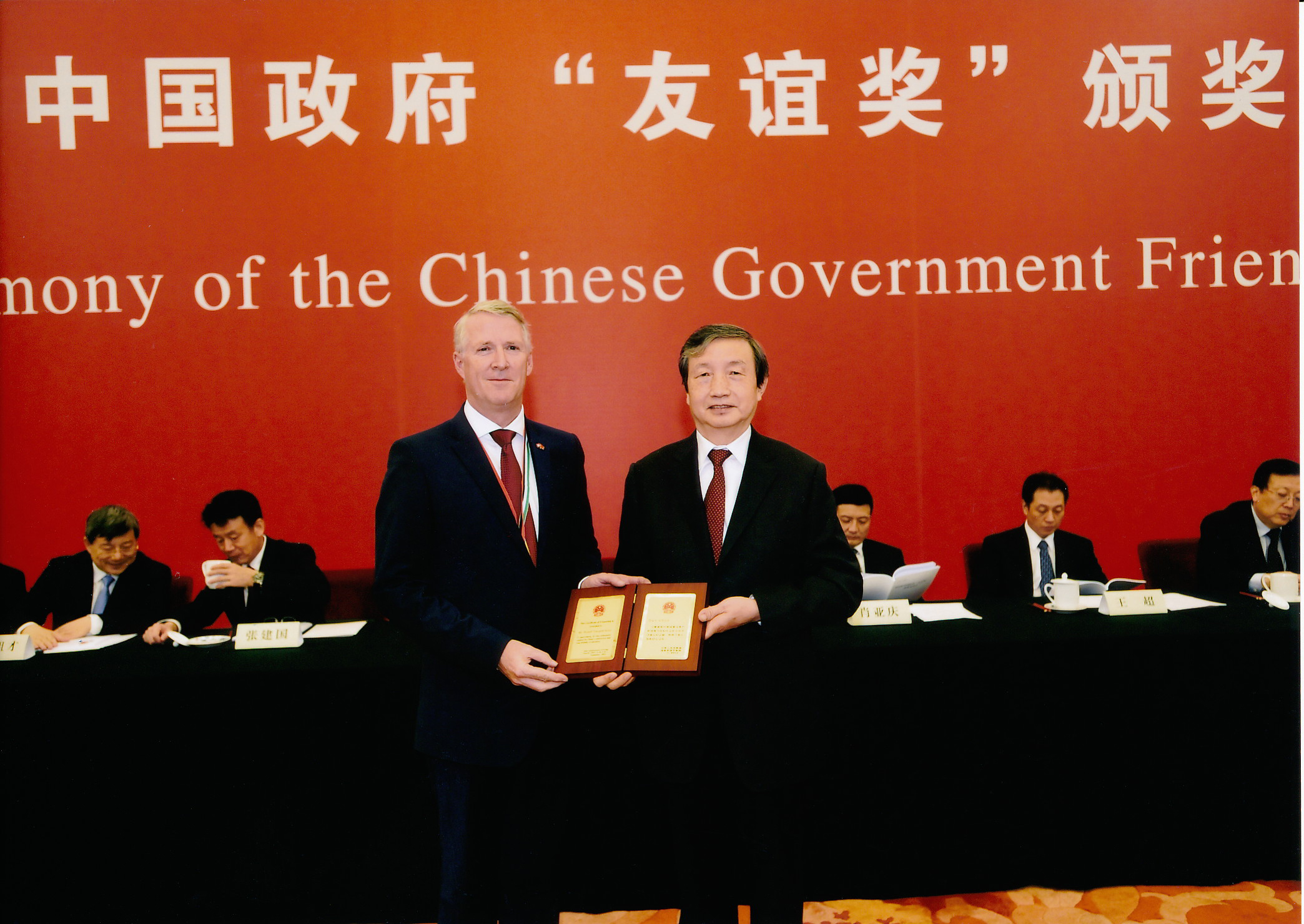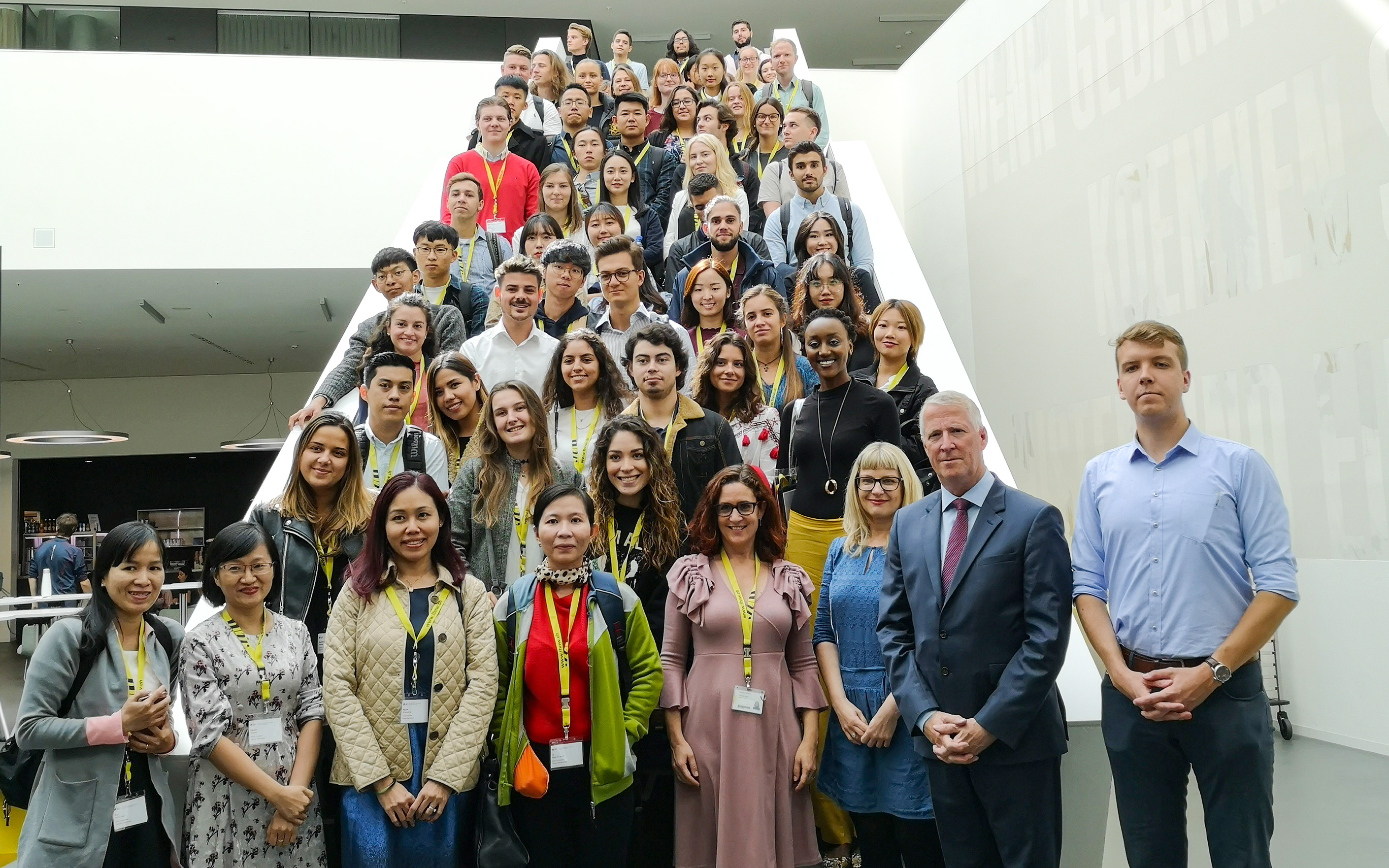Having intercultural knowledge is becoming crucial
When, how and why did the FHNW School of Business start to network internationally? Where do we stand today and what can we expect in the coming years?
Ruedi Nützi, Director School of Business, gives answers to these and other questions – six months before his retirement
Ruedi Nützi: The basic philosophy can be summarised in three sentences. First, internationalisation is not a goal, but our path to practice-oriented education and training. A credible practical orientation must - at least in part - take place abroad. This has to do with the economy and with the two facts: in our country, every second franc is earned abroad and 80% of our jobs are linked to foreign countries. Elsewhere, there may be a strong home market with global players, but in Switzerland, very many SMEs face international competition. That's why, secondly, we have to train graduates who bring international experience from their studies and who know what's going on elsewhere in terms of education policy, economics and culture. Today, Switzerland is an international society with different opinions and cultures. In order to be able to interact here, we need intercultural knowledge, which not only ethnologists and psychologists should know about, but also business students. Third, as universities, we are paid and responsible for ensuring that Switzerland remains internationally competitive. These are our three motives, with practical orientation being the most important driver.
Ruedi Nützi: In 1998, three lecturers took the initiative to offer a course of study in English at the FHNW School of Business. This was approved and implemented in 2000. Everything else followed from that. As the FHNW School of Business, we were the first in Switzerland at that time, but the other universities soon followed suit. Eleven students took the risk of participating in this pioneering course, because a lot was demanded of them. Today, 1,400 students have completed their education and training in English - meanwhile even - albeit simultaneously translated – in Chinese and Thai.
Ruedi Nützi: Initially, yes. This was not part of a long-term strategy; internationalisation was not even on the agenda. Peter Abplanalp, Jürg Schneider and Mike Domenghino were the first. They all had many years of international experience, thought it was important to push this forward, and convinced us all. The initiators – myself included – took the liberty and developed new courses and cooperation activities according to the trial-and-error method. More and more people actively joined in, and our collaboration in Asia, Europe, Russia, and the U.S. grew out of that. Although the word globalisation is now viewed critically, the fact remains that we are strongly networked internationally.
Ruedi Nützi: That was a result of the success of the approach. More and more students took advantage of these courses, and at the same time the whole initiative gained a strong momentum with the student projects: In 2000, we launched "Insight China", soon followed by "Focus India ", and later "connectUS" and "exploreASEAN". All these individual activities had reached a volume that forced us to bundle and integrate. Then as now, I am convinced that the bottom-up approach was the right one and brought us forward quickly. Once you reach a certain volume, it’s worth setting up structures and guidelines. With the Master of Business Administration (MBA) in Vietnam and the managers in China, we generated additional income for eight years.
Ruedi Nützi: In the beginning, the whole thing had a pioneering character and I was of many. I don't want to underestimate or overestimate my role. When I went on trips abroad, I always took employees with me who had never been to that country before - with the intention that they would get their own impression. After that, some stopped, and for others it was the prelude to becoming fully committed to it. For me, that's part of being a learning organisation – constantly trying something new. I was convinced early on that Switzerland needs international success to maintain its prosperity. And that only works if you measure yourself against the best, that is with the USA, with Germany and now with China.
Ruedi Nützi: Internationalisation became more and more important to me, also because I was able to gain teaching experience in different cultures. Just like many other lecturers at the School of Business. I have always been interested in these cultural differences, and I can say that I have learned as much from my students as they have from me. I also taught in Russia, which was particularly exciting because a joint MBA was established with the University of Petersburg. However, when the contact persons there changed, the connection unfortunately broke off. Internationalisation makes it clear repeatedly how collaboration is exposed to external factors that you cannot control yourself.
Ruedi Nützi: We only ever built structures when it was necessary in terms of the scope of activities, so as not to unnecessarily restrict our freedom of action. We founded the China Centre only five years ago, after more than two decades of experience. The International Office, on the other hand, is responsible for student exchanges, which have become much more important in terms of numbers. In contrast, we left research with international partners to the individual institutes. Conversely, the Southeast Asia Centre never achieved the desired breadth, which is why it was dissolved again. In addition, the new Latin American Centre coordinates the activities of all universities of the FHNW with Latin America beyond the FHNW School of Business.
Ruedi Nützi: I like to distinguish between the facts, which can be measured objectively in figures, and subjective experiences, which are just as important in demonstrating the success of our internationalisation. Objectively, we have established numerous degree programs with an international focus at the bachelor's and master's level. In addition, we have gained more than 160 partner universities around the world, which provide our students, staff, lecturers and researchers with access to international projects. We have also succeeded in creating a form of corporate culture in which the international has a firm place and is taken into account in everyday teaching. But there are also many subjective impressions and personal feedback that show what this has triggered in many people and how they have been able to get more interesting jobs as a result. I'm thinking of Franc Kaiser, who was among the first eleven students at the turn of the century, who now lives with his family in Shanghai and runs a company with 50 employees. Then there’s Michael Simonet, who first came to China with "Insight China," who also lives there and now runs his own e-commerce company.
Ruedi Nützi: In the next few years, there will be competition between different social systems, with China and Russia coordinating more closely. We will have to deal with different value systems and get to know the claim to power of the East. China has overtaken the USA economically, and for Europe this raises the question of how we deal with it. The greater the probability of conflict, the more important it becomes to have intercultural knowledge. Taking China as an example, this means that the decisive task of internationalisation will be to impart as much knowledge about China as the Chinese already have about Europe. The same applies to Russia. Only in this way will our students be successful in dealing with differently structured economic markets. At the FHNW School of Business, the culture of entrepreneurship must also be cultivated more, by which I mean being able to implement an idea quickly.
Ruedi Nützi: We are currently in the age of economic policy decoupling. There will be alienation, but also open competition, which even Switzerland cannot escape. Our students must learn to understand communism, not for small talk, but to understand the young generation of Chinese who are convinced of their economic system and stand behind it. They despise the West for what it has done. For Switzerland, which has maintained diplomatic relations with communist China since 1950, the question is how to assert itself positioned between the systems of the USA, China and Russia and represent its own values. With regard to my succession, far be it from me to make recommendations. I would be happy if the FHNW School of Business continued to cultivate an awareness of the international dimensions. The awareness that everything belongs together - regionally, nationally and internationally – has always been a personal concern of mine.
Interview: Florian Blumer



